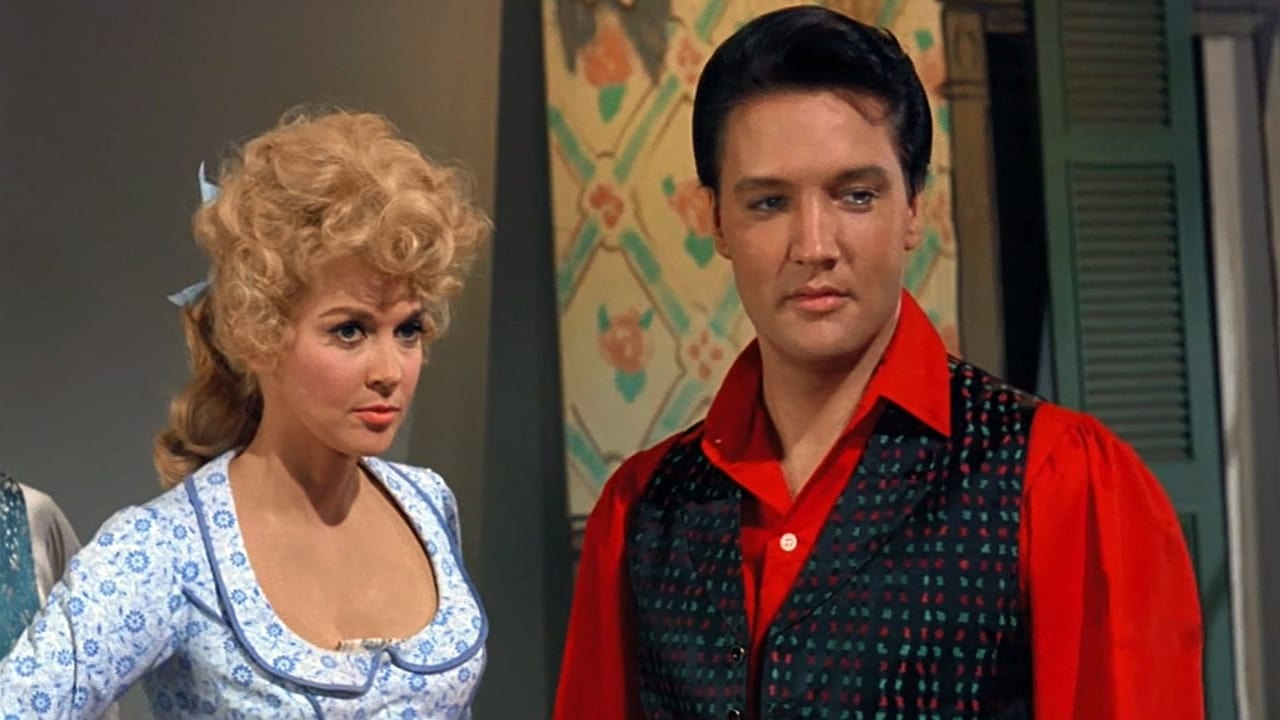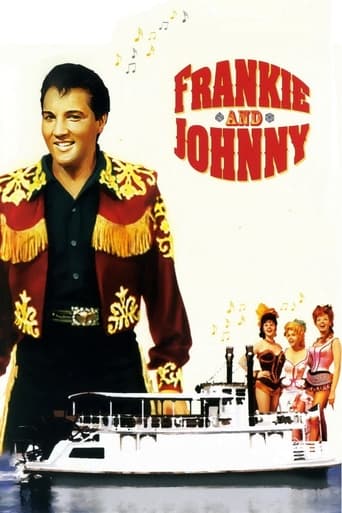

"Frankie and Johnny" is one in the long line of musicals which Elvis Presley churned out in the sixties. It has no connection with the Al Pacino/Michelle Pfeiffer film of the same name from 1991, but is instead fairly loosely based upon the well-known American folk-song. It is set some time in the late nineteenth century, probably around 1880 or 1890, although the exact date is never stated. Johnny and his girlfriend Frankie are performers on a Mississippi riverboat; Johnny is also a compulsive gambler, and as the boat has a casino on board he has plenty of opportunities to gamble. The film deals with the complications caused in their relationship by Johnny's gambling habit and Frankie's jealousy of his friendship with an attractive redhead named Nellie Bly. Johnny's interest in Nellie arises from the fact that a gypsy fortune-teller has informed him that a red-haired woman will bring him luck, but the jealous Frankie suspects that their relationship goes much deeper.One of the problems of casting a rock star in a Victorian period drama is that rock didn't actually exist in the Victorian era. The makers of this film are not really all that concerned with period accuracy- some of the music we hear sounds suspiciously like jazz, which didn't really exist in the 1880s, and even the song "Frankie and Johnny" itself was not published in its modern form until the 1920s. Somebody, however, obviously realised that rock-and-roll would be anachronistic, so the star gets to sing a series of bland, totally forgettable easy-listening numbers.Elvis was always fairly laid-back as an actor, but in this film he doesn't seem to make much effort as a singer either, being content just to stroll his way through the film. The rest of the cast are no better; in his film career Elvis played opposite some pretty obscure leading ladies, but Donna Douglas is one of the least memorable of the bunch. I was not surprised to discover that this was the last film she made in a brief cinema career. About the complicated and often far-fetched plot, the less said the better. Most Elvis Presley films these days are unlikely to appeal to anyone other than his many devoted admirers, but I suspect that even they will find themselves feeling a bit short-changed by this one. 4/10
... View MoreListless, abysmal Elvis Presley outing, loosely based on a 19th century French folk song, concerns a riverboat entertainer (and luckless gambling addict) in New Orleans told by a gypsy soothsayer that his luck will change once he dumps his blonde steady for a redhead. Filmed on the cheap, with Presley faking his way through. Two good EP songs, "Please Don't Stop Loving Me" and "Shout It Out", though the latter number is stolen from the star by a woozy ho-daddy guitarist in the bottom left of the screen. Donna Douglas, Nancy Kovack, and Sue Ane Langdon are a fun femme trio, but Harry Morgan is a colorless sidekick and Elvis just looks beat. *1/2 from ****
... View MoreI give this three stars just because it's a boring movie. I don't think it's bad. It's just really uneventful. I saw this on television once, and I switched over to the Food Network. I kind of remember what it was about, and that's about it. I have sat through probably everyone of his films, and while this isn't as bad as others (Harem Scarem!), it is pretty close. You can really tell that he was have less fun than the viewers. He looks really good (of course), but that's about it. It isn't even a fun bad movie, where you would see him as an Arabian Prince, or a race car driver. Instead of wasting time on this, watch Jailhouse Rock (the best), King Creole and even Blue Hawaii. You'll thank yourself later.
... View MoreFalling close to the middle of Presley's film career in both quantity and quality, this is an exercise in mediocrity with only a few things to recommend in it. Very loosely inspired by the classic title song, it showcases Presley as a riverboat performer and gambling addict. He has a relationship with his singing partner Douglas, but that is strained to the limit when he encounters Kovack, a redhead who he believes is essential in fulfilling his gypsy fortune to win big money at the roulette wheel. Unfortunately, Kovack is the one-time love of Presley's boss Eisley and he isn't quite ready to give her up yet, despite his own affair with kooky chorine Langdon. More direct comedy is provided by Morgan and Christie as Presley and Douglas' married friends. The shenanigans (including mistaken identity, flirtation, drunkenness and the roller coaster of the roulette wheel) all come to a head during a performance of the title song during which Presley's life is endangered. What may sound lively and entertaining in description is only partly so in reality. The pace of the film borders on stagnant, despite the setting, and the many songs Presley performs are chiefly forgettable and unimaginatively staged. Presley is close to his physical prime here, though his performance lacks any real spark. His infamous jet-black hair (which fails to ever move except for one cowlick in front) is incongruous with the time period, as are several of his costumes. It's surprising to see Douglas in a role other than her iconic Elly Mae Clampett. She is unable to ditch the accent from that character despite obviously trying to at various points. She is lovely to look at most of the time, but is obviously uncomfortable in the musical sequences in which her voice is dubbed and her movements are lacking in assurance. Morgan does a decent job, but Christie manages to outshine him with her caustic brand of dry humor. They share some of the movies most amusing bits. Langdon is, as usual, very broad in her role though she does contribute some energy to the proceedings. Eisley is adequate. Nothing more. Kovack is attractive, but, like Douglas, far from seeming at home in the musical interludes. The songs are mostly forgettable and the one major song, the title tune which has endured for so long, is rather mangled by switching it from a narrative style to a first-person number with people singing about themselves. Few things are as uncomfortable-looking as Presley loping down the street in his marching band get-up. Though the film has many colorful costumes and settings, it comes off as pretty cheap-looking. Fans of The King will still want to watch this for his brand of light romance and comedy, but it hardly ranks as one of his best outings.
... View More